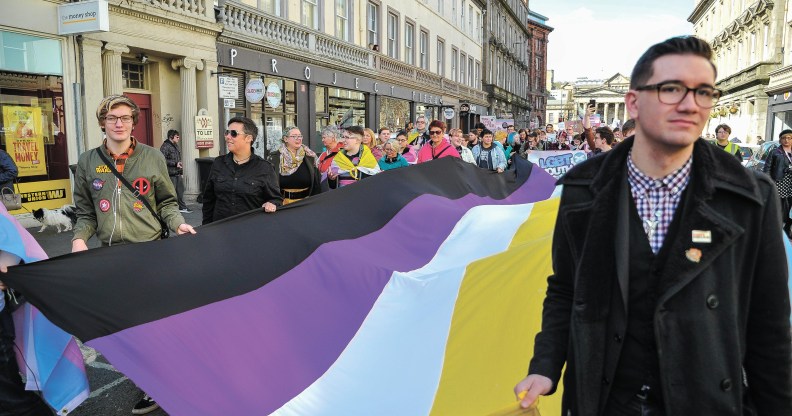Jaguar Land Rover ordered to pay £180,000 to genderfluid engineer after relentless campaign of harassment

People hold a non-binary flag at Pride. (Stewart Kirby/SOPA Images/LightRocket via Getty)
A genderfluid engineer who was called “it” by her colleagues at Jaguar Land Rover has been awarded £180,000 in damages in a landmark discrimination case.
On Friday (2 October), a judge awarded Rose Taylor £180,000 in compensation after the court heard how her Jaguar colleagues abused and harassed her in 2017 after she came out as genderfluid at work.
Jaguar Land Rover has also apologised, after initially arguing against Taylor’s claims, and has said it will use the outcome of the tribunal to inform its “diversity and inclusion strategy”.
Robin White, Taylor’s barrister, said her client was pleased with the outcome of the case.
“The claimant is very pleased and also about the fact that the case could make a difference in the future,” White said. “Hopefully that will mean others may not suffer difficulties in the workplace as she did.”
Taylor took her former employer to court over claims of harassment and direct discrimination in the workplace, and in September won an employment tribunal against her former employer that confirmed non-binary and genderfluid people are protected from discrimination under the Equality Act 2010.
The ruling has been hailed as a milestone win for equality by campaigners, with the tribunal making it clear that “gender is a spectrum” and that it is is “beyond any doubt” that the Equality Act protections apply to people with diverse gender identity or expression, and not solely transgender men and women.
Tribunal judge Pauline Hughes was also hopeful that Taylor’s case would bring positive change in the movement for equality, telling the tribunal: “Everyone in the room can think of a person who has made a difference in their life. The entire history of equality and equality movement has individuals such as the claimant who have made a difference.”
Under the non-discrimination law passed by the Labour government in 2010, people are entitled to protection from discriminatory treatment in the workplace based on a number of protected characteristics, including sexual orientation and “gender reassignment”.
The tribunal heard about a barrage of abuse and teasing Taylor experienced after socially transitioning at work in 2017, including one colleague who asked if Taylor’s outfit “was for Halloween” and another who told her: “It’s nice to see you in this attire. You have cracking legs.”
Another Jaguar Land Rover worker asked her: “So what’s going on? Are you going to have your bits chopped off?” She also overheard two others say: “Have you seen IT in the atrium?”
One female co-worker also described her as “not normal” when she announced she was transitioning, while another asked her why the “top half didn’t match the bottom half”.
Dave Williams, executive director for HR at Jaguar Land Rover, apologised to Taylor on behalf of the company.
In a statement, he said: “We continue to strive to improve in this area and we respect the outcome of the case.
“Jaguar Land Rover does not tolerate discrimination of any kind. We are committed to creating an environment where everyone can flourish, where our employees feel listened to, understood, supported and valued equally.”

